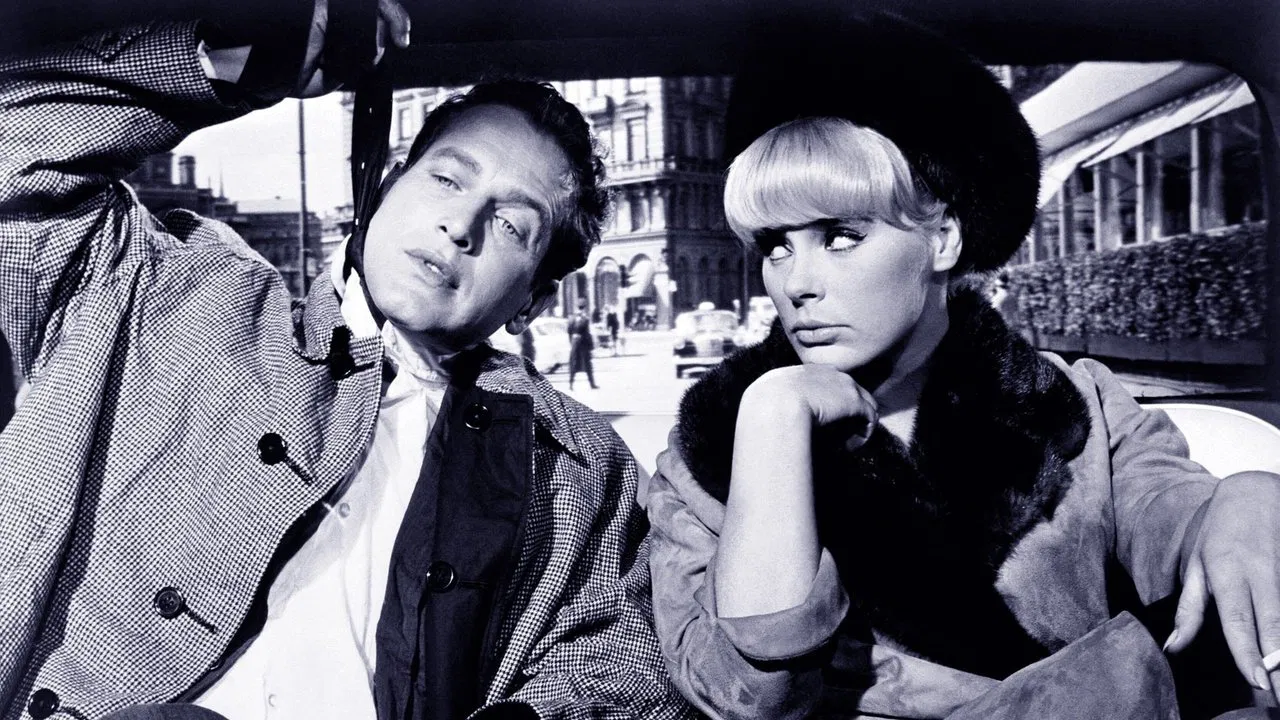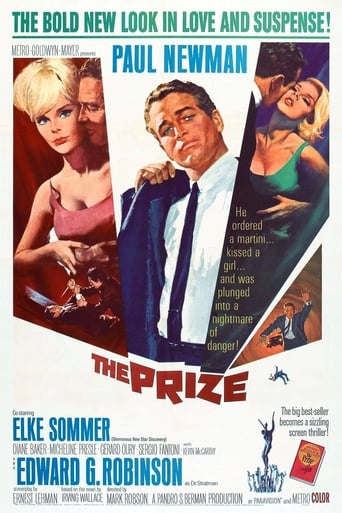

In Sweden to be awarded the Nobel Prize in literature, author Andrew Craig (Paul Newman) jokes that fellow laureate Dr. Max Stratman (Edward G. Robinson) might be an impostor and no one would know. Turns out the joke is closer to reality than Craig realizes as Dr. Stratman has been replaced by a Communist lookalike. Craig becomes suspicious of the impostor and soon his suspicions put his life in danger.Mark Robson's enjoyable spy movie has Hitchcockian elements but doesn't quite reach the level of the master. The pieces are there, though. Newman's his usual charming self and has good chemistry with Elke Sommer and Diane Baker. Robinson's always great. It's a little overlong and the first hour could use a trim. Hitchcock would have jumped into the main plot a lot sooner, I think. But that's just one of the many differences between a decent director and a great one.
... View MoreThe Prize falls somewhere between North by Northwest and the Pink Panther as a mix of mystery thriller and comedy. It should be viewed as light entertainment, much like a Poirot or Agatha Christie mystery. I had not seen this before, and looked it up for the early Jerry Goldsmith score, which is colorful, but more of a nondescript background piece than most of his work. What I found interesting is the place of The Prize in the many mystery- thrillers of the period, along with the Ernest Lehman script. Beginning with Hitchcock's North by Northwest (with script by Lehman), the thrillers mixed in some subtle humor to make the films seem cool and hip. The James Bond series, which began in 1962 with Dr. No followed by Goldfinger, is a classic example, but you also see it in Mirage, and later The Ipcress File and Gambit. But it is never slapstick humor in the main body of the genre. Then, with The Pink Panther, A Shot in the Dark, and Casino Royale the humor becomes dominant, using the thriller only as a foundation. In The Prize you see an attempt at about a 60-40 mix of thriller and humor. Does it work? The viewer must be the judge. But if it had been a 90-10 mix like Northwest, it would have failed, at least without mixing in more danger and believability, and this would have been a different movie, not so family oriented for the time. I don't think the plot is strong enough to be a straight thriller, and neither, apparently, did the director. Ernest Lehman turned in a good script that puts the pieces of the complex jigsaw puzzle together efficiently, but without the snappy, memorable dialog of his other work. It is worth watching twice to look for the subtle cues and red herrings he throws in. But I think the director, Mark Robson, did not demand enough from most of the A-list actors to give the movie realism. I guess he was going for light comedy, and it is funny enough. The bad guy with the pointed hat was a nice touch, an allusion to Mad Magazine's Spy vs. Spy comic series, which he looked like. The light style and format, with its almost random romantic interaction, seems to anticipate Love Boat. But I feel better directing could have raised the movie a notch. I wonder what Hitch would have done differently? I wonder if he was offered the movie, but turned it down? Compared to some modern movies in this genre, such as Flawless, I think The Prize's plot and script are far more complex, tight and interesting. But modern audiences might be disappointed by the relative lack of adrenaline-driving action.The movie opens saying it is set sometime in the future. The only indications of this are the nature of the prizes, which, presciently, include Nobels for in vitro fertilization, organ transplants by suppressing the immune response, and solar energy. I don't know whether Irving Wallace or Lehman deserve the credit, but someone did their homework, and got the future right by about 20 years. As to Paul Newman's performance, I think it is just fine. You see him change as the plot progresses from a cynical, depressed writer, to a revitalized man who has found his groove and his girl. Anyone who views this performance as evidence that Newman was an egotist is confusing the role with the person. Newman, who never lived in Beverly Hills, was one of those great actors who never let fame go to his head. I couldn't help wondering what Richard Feynman thought of this movie. He discusses his feelings about accepting the Nobel Prize in his memoirs. I wonder if he mentioned this movie?I also couldn't help but wonder to what extent the real life version of Leo G. Carroll's character does worry about scenarios such as impersonation? But I assume security matters are secret.As to the nudist scene, which echoes Lehman's Northwest auction scene, the curious part is that it precedes the nudist camp scene in Peter Seller's A Shot in the Dark. I have the feeling the publicity department might have had something to do with it, as "Sweden" and "nudist" certainly would have gotten the public's attention back then. There was apparently a lot of cross fertilization of ideas within the genre of the period, sometimes with improved effect. The classic Peter Sellers nudist scene is far funnier, and about the only worthwhile part of the movie. But I would loved to have seen Hitchcock's face when he saw the nudist scene. And Lehman's face when he was writing it!In short, I give The Prize an A for originality of concept, a B for tightness of plot, and a C for directing.
... View MoreJust weeks before traveling to Stockholm in the summer of 1964, we had seen the movie "The Prize" and the distance from the level where the killer was flipped downwards onto the statue with the spear or sword which impaled him was FRESH in the mind. The movie had shown the distance from the beginning of the fall to the impalement as being about straight down. Actually, the distance the falling body would have had to have covered was more like 40 to 60 feet. Through the years, we have seen no comment on this error. Tonight (12-8-09) we saw the movie again on TCM for the first time in 46 years and again, we saw the "photographic filming error". The impalement was viewed with glee since the killer had almost done away with Paul Newman . . . but, the depiction of the disposal of the Russian "hit man" could have been authentic. Advice: go to the scene in Stockholm today and assess the distance under consideration . . and draw your conclusions. S. Brewer
... View MoreAn enjoyable comic thriller filled with familiar incidents. If, in "North by Northwest," Cary Grant is pursued in an open field by an airplane, here Paul Newman is chased back and forth by a murderous car on a long bridge. If, in the first, Grant must make himself enough of an annoyance in an auction to be rescued by the cops, here Newman must do the same at a meeting of nudists in a gymnasium. It's not too surprising since both films were written by the same man, Ernest Lehman. You can REPEAT yourself but you can't PLAGIARIZE yourself. Lehman even throws in an image from a Hitchcock number he had nothing to do with. In "Saboteur", the heavy falls from the Statue of Liberty. Here he falls from a rooftop in Stockholm and is impaled on the sword of a huge statue below. And the substitution of the evil Robinson for the good Robinson is from Hitchcock's "Foreign Correspondent."Newman is a former literary star, invited to Stockholm to accept a Nobel Prize, who has lost his willingness to try and now devotes himself to writing detective novels under a nom de plume and to drinking martini after martini. As far as the alcoholism goes, though, he remarks near the beginning, "Ewww. This is my third martini and I haven't even had breakfast yet," so he retains his amateur standing.Anyway, the booze business is dropped once he's swept up into a Cold War plot to substitute a faux scientist, a twin of Edward G. Robinson, who is a benign American scientist. At the awards ceremony, the Soviet ringer plans to make a speech condemning free enterprise, capitalism, the exploitation of the working class, the decadence of the West, miniskirts, shaved legs, hair mousse for men, electronic fussball, and Yosemite Sam. The genuine Robinson has been kidnapped and the sinister Robinson has taken his place. The difference between the two is nicely done -- mostly a matter of having the good Eddie smiling weakly and the bad Eddie scowling and sounding like Little Caesar in retirement. Make up has added darker, thicker eyebrows to the evildoer.It is Newman's self-appointed job to unravel the plot and restore the correct Robinson to his justified place on the dais at the ceremony. He will be helped by his toothsome chaperone, Elke Sommer, whom he squeezes so vigorously at one point that she complains he is breaking her "rips", something any normal man would enjoy doing.The inquiry takes Newman through myriad Swedish settings, from grand parties at the royal palace, through filthy rusting ships, to hotels in which he must run through the corridors wearing only a towel around his waste -- everybody's favorite nightmare.The direction by Mark Robson is professional and so are the performances. Paul Newman is a bit of a surprise. He's never been particularly good outside of dramas but he's quite effective here. Watch him try to explain to the skeptical Stockholm police that he has discovered the body of a murder victim and add that the body has now disappeared. Oh, the body has disappeared? Newman looks momentarily taken aback as he realizes how ludicrous this sounds, hesitates, then plunges determinedly ahead -- "Well . . . yes!" Cary Grant would have walked away with this part but Newman carries the ball well.The whole thing is a wanton ripoff of Hitchcock but it's so amiable and so funny in its characters, situations, and wisecracks, that it doesn't really matter. You'll probably enjoy it.
... View More